About K-CEP
The Kigali Cooling Efficiency Program (K-CEP) is a philanthropic collaboration launched in 2017 to support the Kigali Amendment of the Montreal Protocol and the transition to efficient, clean cooling solutions for all. K-CEP’s program office, the Efficiency Cooling Office, is housed at the ClimateWorks Foundation.
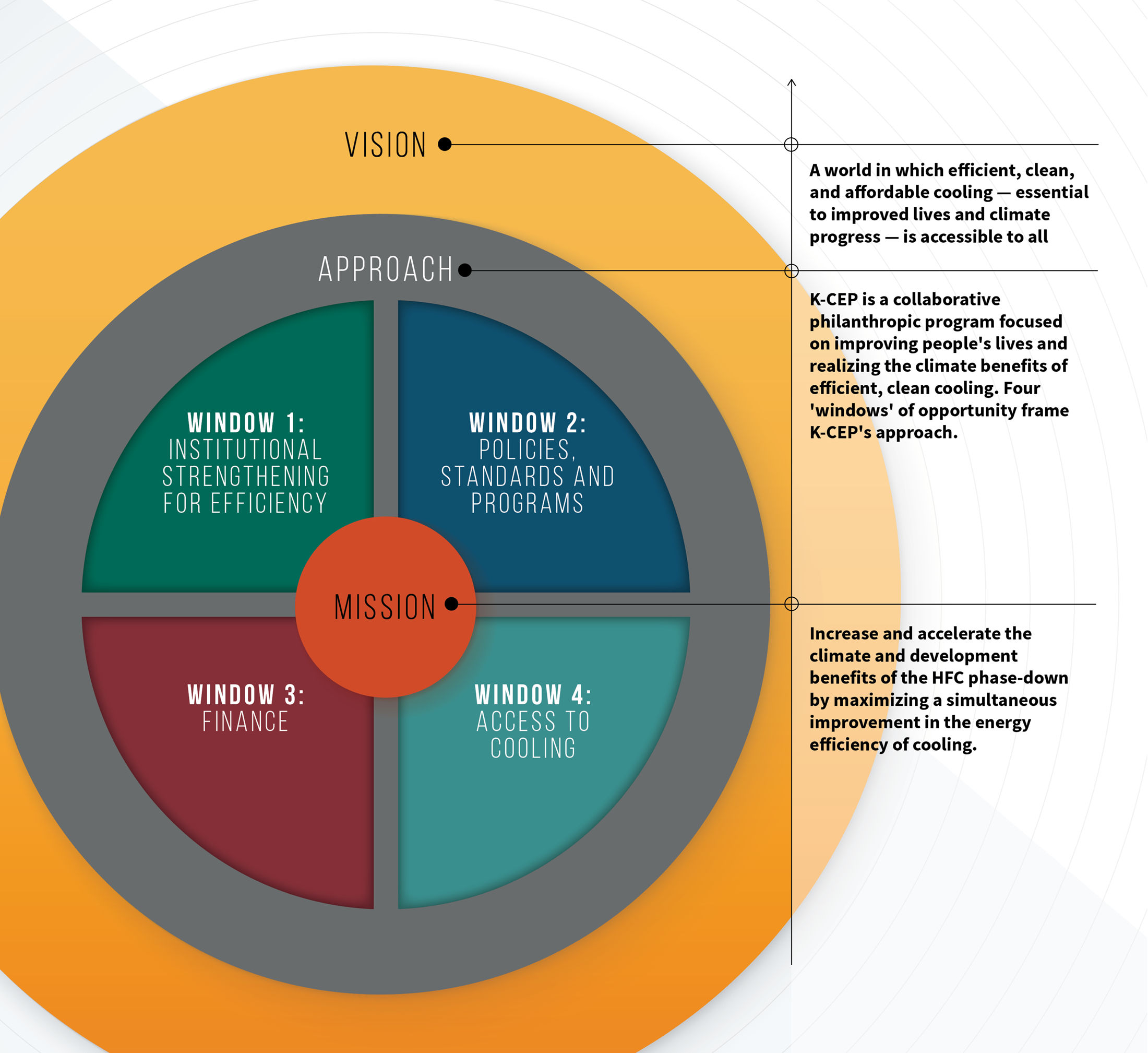
Foreword
By Erin Rogers, Program Officer, Environment, William and Flora Hewlett Foundation
 In October 2016, I stood facing hundreds of delegates at the UN Montreal Protocol meeting in Kigali, Rwanda. I was there to deliver a promise on behalf of the diverse foundations and individual donors that had collectively pledged more than $50 million in support. For those developing nations that agreed to rapidly phase down super-polluting refrigerants, we pledged support for adopting energy-efficient cooling at the same time. We committed to rapidly deploy the funding, to match the countries’ commitment to a rapid transition of refrigerants.
In October 2016, I stood facing hundreds of delegates at the UN Montreal Protocol meeting in Kigali, Rwanda. I was there to deliver a promise on behalf of the diverse foundations and individual donors that had collectively pledged more than $50 million in support. For those developing nations that agreed to rapidly phase down super-polluting refrigerants, we pledged support for adopting energy-efficient cooling at the same time. We committed to rapidly deploy the funding, to match the countries’ commitment to a rapid transition of refrigerants.
We moved quickly within a short window of opportunity in ways that neither government nor the private sector can easily do. The scale and speed of this initiative (the largest philanthropic energy efficiency fund ever created), the potential for impact, and the intensity of ongoing collaboration as K-CEP moves into implementation in partnership with government and the private sector have been exceptional.
Within five months of the adoption of the Kigali Amendment, we formed a Funder Steering Committee, agreed to principles of collaboration, hired three expert staff who formed the Efficiency Cooling Office, launched a 20-member Technical Advisory Committee, and sought input from around the world to develop a robust strategy. We officially launched the Kigali Cooling Efficiency Program in March 2017.
K-CEP is able to report even more exciting progress in this first Annual Report. At the end of its first year in operation, K-CEP is reporting on close to $30 million committed to projects, including direct support to 38 countries. Alongside new partners, K-CEP is charting new territory: for the first time, the UN’s Montreal Protocol experts are diving into energy efficiency and connecting with energy policy-makers. For the first time under the Kigali Amendment, the Montreal Protocol’s Multilateral Fund will support an industrial manufacturing conversion project (which K-CEP is supporting to bring in efficiency). K-CEP’s grantee community is collectively tracking results, and we are all learning and adapting as we go.
On behalf of all of the K-CEP philanthropic funders, I offer deep appreciation for the years of hard work by NGOs, governments, and many others that led up to this moment, and for all of the continued work that is to come. I’m inspired by the creativity, passion, tenacity, and spirit of collaboration that pervades this effort, and hopeful that we will be successful in saving lives, increasing health and prosperity, and cooling the planet.
K-CEP's First Year
By Dan Hamza-Goodacre, K-CEP Executive Director
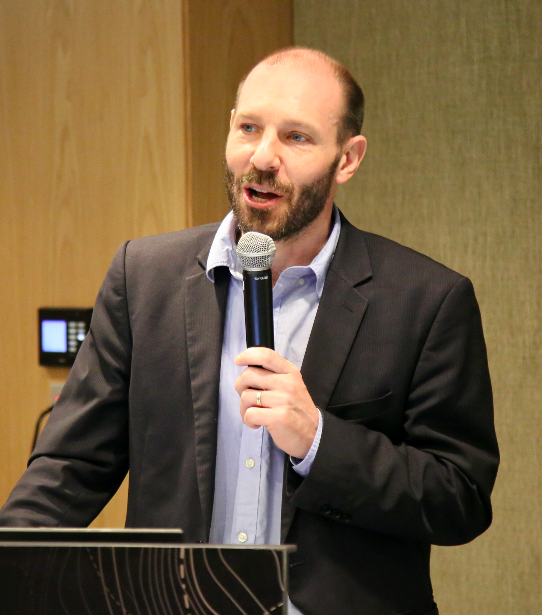 I’d like to start by saying thank you to everyone working to make cooling more efficient and clean.
I’d like to start by saying thank you to everyone working to make cooling more efficient and clean.
You are advancing one of the biggest solutions to climate change and unlocking benefits for health, livelihoods, and access to energy.
These collective efforts will make our planet safer, more equitable, and more prosperous. I hope you enjoy reading the first annual report for the Kigali Cooling Efficiency Program (K-CEP), and that it fills you with a bit more optimism about the future.
Our focus in this first year has been laying a solid foundation for program “take-off.” K-CEP was established to support developing countries integrate energy efficiency into the reduction of super polluting fluorinated gases (HCFCs and HFCs), used as refrigerants in cooling. This is required under the Kigali Amendment to the Montreal Protocol, the world’s most successful environmental agreement, and can avoid up to 0.5° Celsius of warming by end of this century. Our parallel efforts to improve energy efficiency of air conditioners and other cooling devices could double the size of the climate prize to 1°C of avoided warming, essential to the goal of limiting global average temperature rise to well below 2°C.
The baseline on cooling efficiency is unacceptable– the market average efficiency of air-conditioners is three times less than the best available efficiency. In many developing countries it is far worse. The majority of countries still have no or extremely low minimum energy performance standards for cooling technology.
The impacts of needless inefficiency are dreadful: Approximately 500 million people are at high risk from heat stress, most of them women, children, and the elderly; and 400 million tons of food is wasted each year, much of which is a result of non-existent cold chains needed to preserve food. Another 2 million lives are lost each year due to a lack of vaccines, many of which spoil in the absence of cooling. We can and must do better to bring efficient, clean cooling to all.
In K-CEP’s first year, we have offered support to 38 countries which together represent the biggest climate pollution opportunities in the developing world. We have also supported a global training platform to be launched in Beijing this April, to provide capacity building for all 147 developing countries.
In shaping our work, the K-CEP community of international organizations, NGOs, academics, businesses, and expert advisors, has responded to country needs, whilst pushing for the greatest ambition. That is why K-CEP philanthropic funding is committed to those countries pledging to go furthest and fastest with their commitments to the Montreal Protocol F-gas transition. Of course more needs to be done by us and by others, but with focus, resolve and the capacity to act, we can make a quantum leap forward in efficient, clean cooling in the next few years.
There’s a lot for you to discover. As you read about early stage policy and private sector action and global leadership by the United Nations, you will see how the movement is building. Only together will we realize the huge prize from efficient, clean cooling and avoid a downward spiral where inefficient cooling continues to warm the planet, while spurring demand for even more damaging cooling. By helping governments, businesses, and consumers step up, then together we can raise cooling technology standards, unlock capital, and transform markets so that efficient, clean cooling can be used by all.
With “cool” wishes,
Dan
The Year in Numbers

Interviews With Minister Vincent Biruta and Jürgen Fischer
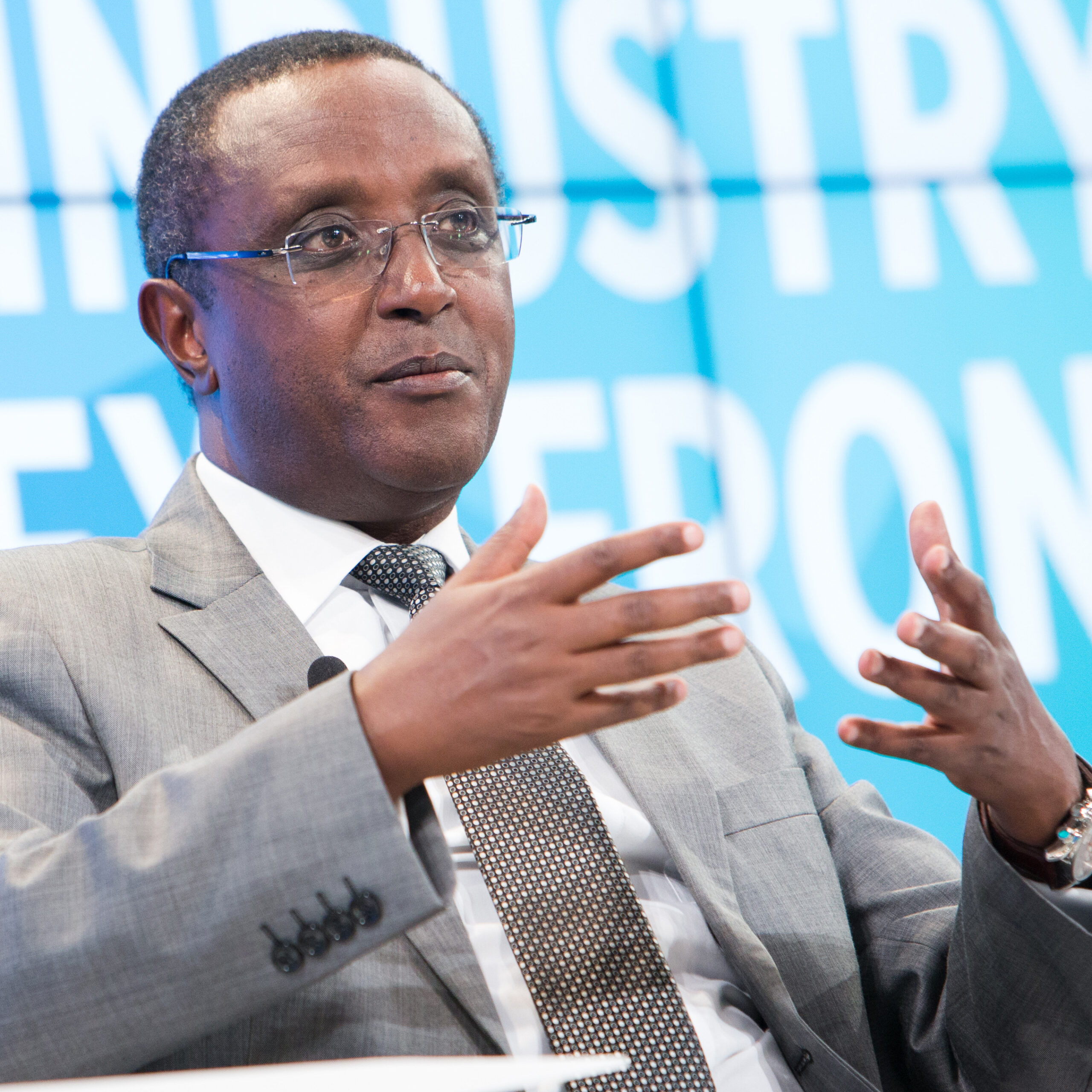
Hon. Dr. Vincent Biruta
Minister of Environment for Rwanda
Why is efficient, clean cooling so important for Rwanda?
Rwanda’s vision is to become a developed, low carbon economy by 2050. To achieve this, we need to foster economic growth that is inclusive and sustainable. By harnessing the latest technologies, we can improve access to efficient cooling appliances including air conditioners and fridges, while also reducing government spend on energy generation and electricity bills for consumers. This has a positive economic impact as energy costs in sectors, e.g. industry, health and education, shall be reduced. Efficient cooling is central to our green growth ambitions.
Rwanda showed great leadership in securing the next phase of the Montreal Protocol. How can the strengths of the Montreal Protocol be applied to realize more efficient, clean cooling?
The Protocol’s success lies in the partnerships between policy makers, scientists, and industry. It is an agreement for which everyone is on board and working to agreed goals to phase out ozone depleting substances and to phase down HFCs. We now have an opportunity to apply the strengths of the Protocol to energy efficiency. Doing so could double the climate benefits of the Kigali Amendment, and avoid up to one degree Celsius of warming by 2100.
What options is the Government of Rwanda considering to promote efficient, clean cooling?
We are pleased to be working with K-CEP and UN Environment on the Rwanda Cooling Initiative. This includes an energy efficiency market survey, development of a National Cooling Strategy, and exploration of energy performance standards and labeling. We are confident this will support Rwanda to promote efficient, clean cooling as required by the Kigali Amendment. We are also developing green building standards to encourage smart design and the use of construction materials and techniques for passive cooling.
What will the world of cooling look like in future?
In the future the world of cooling will be efficient, connected and smart. Demand for cooling will no longer be a major cause of global warming. Cooling will be available and affordable for all. Cooling appliances, from the household level to industry, will utilize the latest technology meeting stringent efficiency standards and the requirements of the Kigali Amendment. These systems will be connected, with thermal cooling and demand management enhancing efficiency and efficacy.

Jürgen Fischer
President of Danfoss Cooling, a global business that engineers technologies that cool people, products and the planet.
What is Danfoss doing to progress sustainable cooling?
As an industry leader in air-conditioning and refrigeration, we work with our customers and organizations such as SEforALL and the European Partnership for Energy and the Environment. We also support international efforts such as the Montreal Protocol, to advance a pathway to sustainable cooling. Through continued investment in innovation we actively develop low-GWP refrigerant technologies and ways of combining energy efficient heating and cooling to unleash the full potential of cooling technologies.
What challenges does business face in making sustainable cooling accessible to all?
A united effort is needed if we are to seize the potential of sustainable cooling technology. Two actions are key to make sustainable cooling accessible for all: First, existing minimum energy performance standards need to be enforced and second, installers and users need to be trained in handling and optimal maintenance of cooling systems.
If you were a policy maker what would you do to progress sustainable cooling as quickly as possible?
At Danfoss we trust in regulatory frameworks that shape the sector in two ways: by raising awareness about the energy savings from existing best in class cooling technology; and enabling the cooling sector to accelerate the uptake of renewable energy by utilizing its thermal storage capacity. We need to incentivize energy-efficient technology by using a total cost of ownership perspective. For example, if European standard cold chains are implemented in developing countries, a significant reduction in the post-harvest losses of fruits and vegetables for 2-3 years could finance the technology and enhance farmer incomes.
How confident are you that climate impact from cooling will come down as needed and why?
There is great CO2 saving potential by implementing best-available technology today, so we are confident. Take the food cold chain, for example, where globally one third of all food produced is either lost or wasted due to inadequate refrigeration. By leveraging existing elements of their cold chain, like refrigerated trucks and storage rooms for farmer cooperatives, we can improve the lifespan of food and reduce food wastage.
K-CEP is working with Montreal Protocol institutions and associated agencies, parties and companies, to support developing countries in integrating energy efficiency into the F-gas transition, thereby cutting pollution and costs, while improving access to clean, efficient cooling.
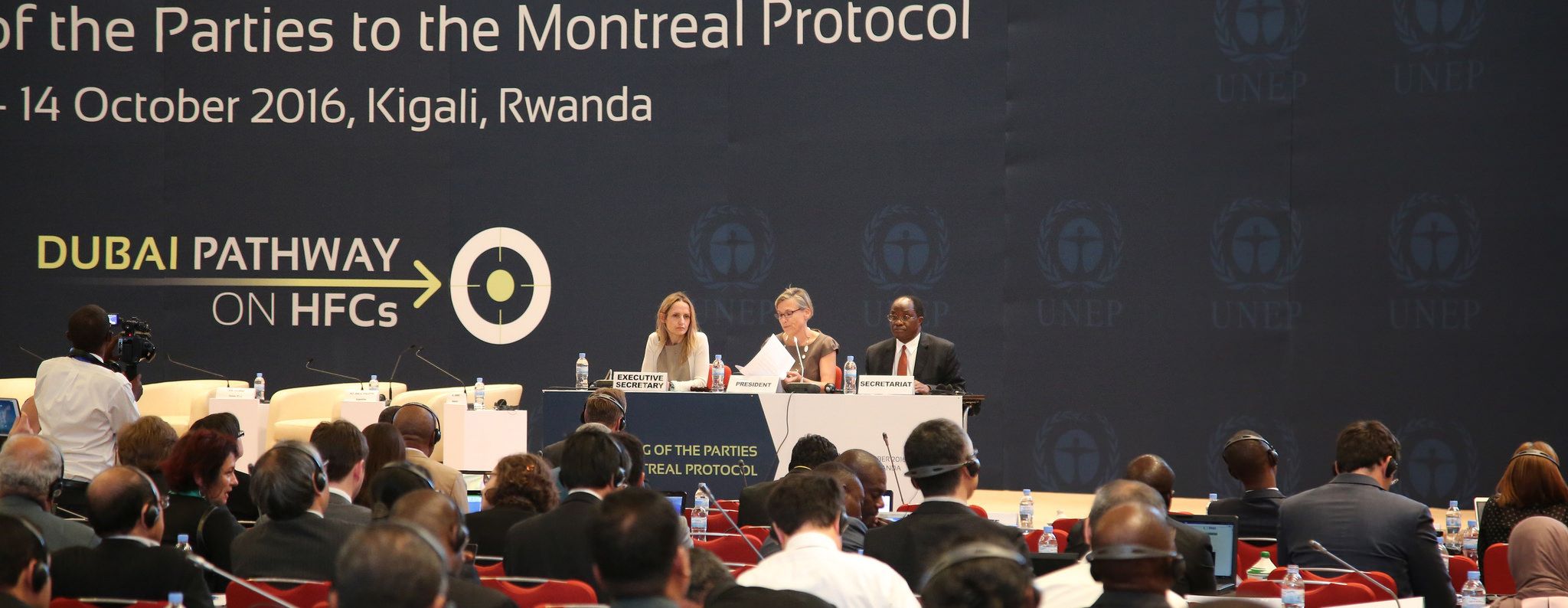
K-CEP’s approach is to promote ownership by countries, with fast implementation and south-south sharing of knowledge to ensure more effective progress. Early-adopter countries and companies can catalyze similar work in other countries. Events in our first year, such as our conferences in Asia and Africa, and presentations at meetings of parties to the Montreal Protocol, provided opportunities to share and scale K-CEP work.
There are many opportunities to achieve improvements in Energy Efficiency during the transition to low GWP refrigerants.The Montreal Protocol Technology and Economic Assessment Panel
Supporting ambitious governments to develop national cooling efficiency plans
National Cooling Plans in 13 countries
Who? United Nations Development Programme, with National Ozone Units (NOUs) leading implementation in-country
Who? Chile, Costa Rica, Cuba, Panama, Trinidad & Tobago, Uruguay, Venezuela, Malaysia, Bangladesh, Sri Lanka, Ghana, Nigeria and Lebanon
How? National Ozone Units are working with energy efficiency experts to build their capacity, support coordination with national energy efficiency policymakers, convene country level dialogues, and develop national plans or roadmaps assessing approaches to improve energy efficiency. Such approaches include: bulk procurement, replacement programs for inefficient equipment, alternative cooling strategies, and analysis of national standards and labeling for AC and refrigeration.
Why? Filling the gap in energy efficiency expertise is needed for countries to incorporate energy efficiency into existing plans for the F-gas transition (as required by the Montreal Protocol), as well as finding links to other national plans such as NDCs or development plans.
Training and capacity building for National Ozone Officers and energy efficiency policy makers
Providing training through “twinning” National Ozone Unit (NOU) officers with energy efficiency policy makers from their own countries
Who? UN Environment, supporting all 147 developing countries
Where? Global, with ten regional ‘twinning’ events
How? This two-year “twinning” project is providing regional workshops in conjunction with UN Environment OzonAction network meetings. Policy makers are receiving training in market transformation and policy development and implementation, covering common solutions like standards and labels as well as practical action, such as how to integrate cooling efficiency into training of the cooling service sector.
Why? To bring together and jointly build the capacity of National Ozone Officers and national energy policy makers to link energy efficiency with Montreal Protocol objectives in support of the Kigali Amendment and efficient, clean cooling. This should raise awareness and capacity to act across the developing world and better inform what parties want to collectively do on energy efficiency through the Montreal Protocol.
Support to enhance and integrate existing knowledge resources such as training manuals, knowledge platforms and toolkits on energy efficient cooling
Training for servicing technicians on energy efficiency
Who? United Nations Development Programme, with Lebanon National Ozone Unit
Where? Lebanon
How? K-CEP is funding a training module on energy efficiency which will complement Montreal Protocol funded activities in the refrigeration and AC servicing sector. A ‘train the trainers’ approach will promote further replication of the training benefits.
Why? Technicians regularly service cooling equipment for refrigerant performance but typically don’t look at energy efficiency. Neglecting the optimization, monitoring, and maintenance of cooling equipment results in increased energy use, lower cooling performance, and shortened equipment life. Better educating technicians promotes best practice and associated energy savings. According to a K-CEP knowledge brief prepared in January 2018 with Carbon Trust support, improving these practices for all cooling equipment could reduce cumulative emissions by 30 gigatonnes of CO2 globally by 2050.
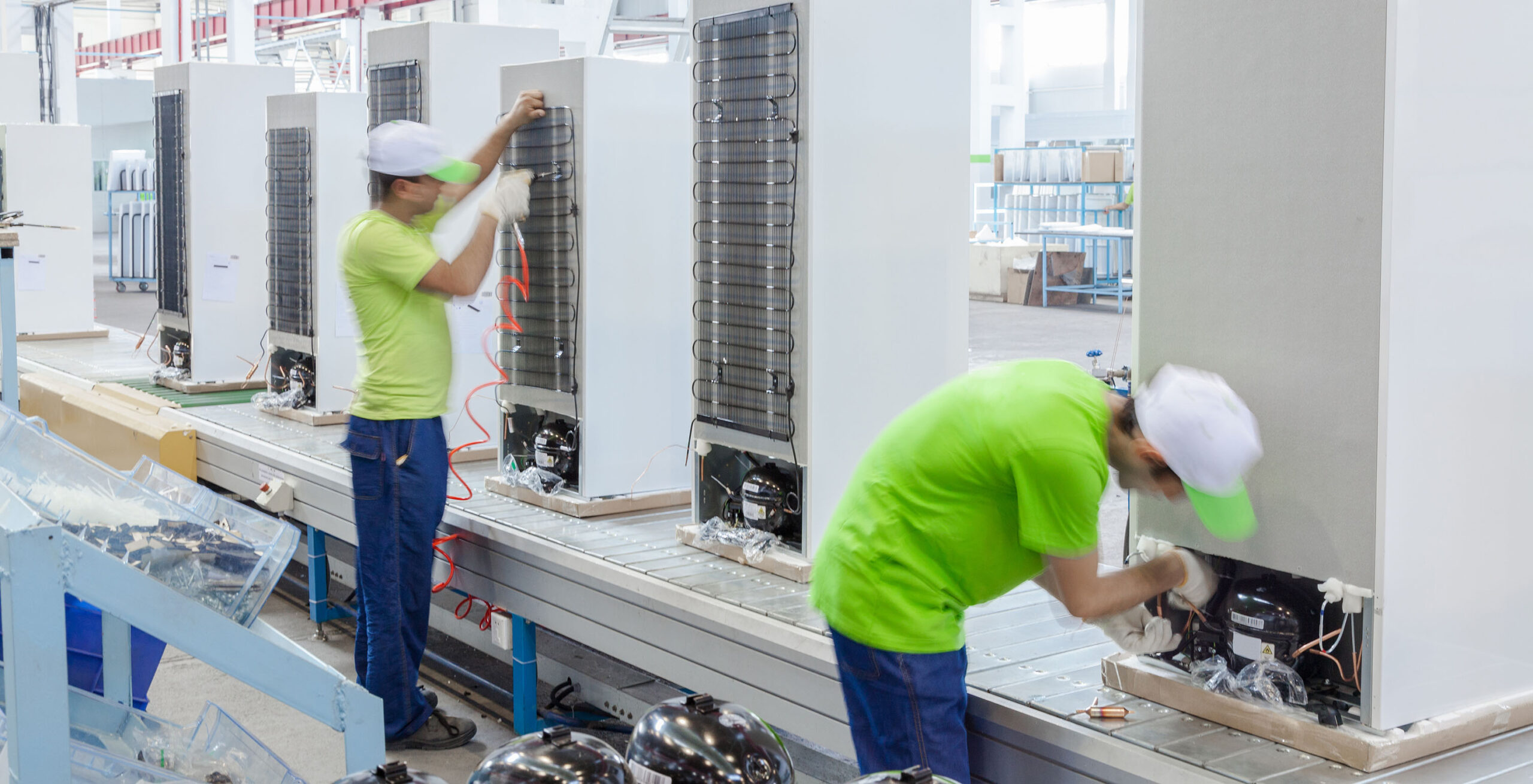
Maximizing the efficiency of domestic refrigerators by working with manufacturers in Bangladesh
More About This Case StudyThe international HFC phase down will mean that many manufacturers must retool their production lines to produce appliances which use climate-friendly refrigerants. This transition provides an opportunity to switch to energy efficient appliance designs at the same time.
In November 2017, the Multilateral Fund (MLF) Executive Committee approved the first ever manufacturing plant conversion investment project under the Kigali Amendment. This financing will allow Bangladesh to eliminate 85% of HFC-134a, a super polluting refrigerant which is largely consumed by the domestic refrigerator manufacturing sector. K-CEP is working alongside the MLF so as to maximize the energy efficiency of domestic refrigerators produced in Bangladesh as the country moves to using low-GWP refrigerants.
K-CEP’s support, combined with MLF and Walton Hi-Tech Industries Ltd funding, will directly promote the phase-out of 282 tons CO2e in the Walton Hi-Tech Industries Ltd plant.
UNDP and Bangladesh’s Department of the Environment are working with Walton, the leading domestic refrigerator manufacturer in Bangladesh. Walton is at a decision point around designs and appliance sizes, however there is a lack of in-house knowledge on how to incorporate best practice energy efficiency design into their appliances. K-CEP support will provide technical advice and capacity building to help Walton to improve its equipment design, use efficient components, and optimize appliance energy consumption.
This first of its kind project will enable Bangladesh and Walton to meet their aims to manufacture energy efficient equipment that uses climate-friendly refrigerants and optimize the conversion of Walton’s plant. More broadly, there is an opportunity to shift the domestic refrigerator market to efficient, clean products, build capacity to help further develop energy efficiency standards, and raise public awareness of energy efficiency in the domestic refrigeration sector.
K-CEP engages with countries willing to ambitiously and quickly integrate energy efficiency into solutions to deliver cooling.
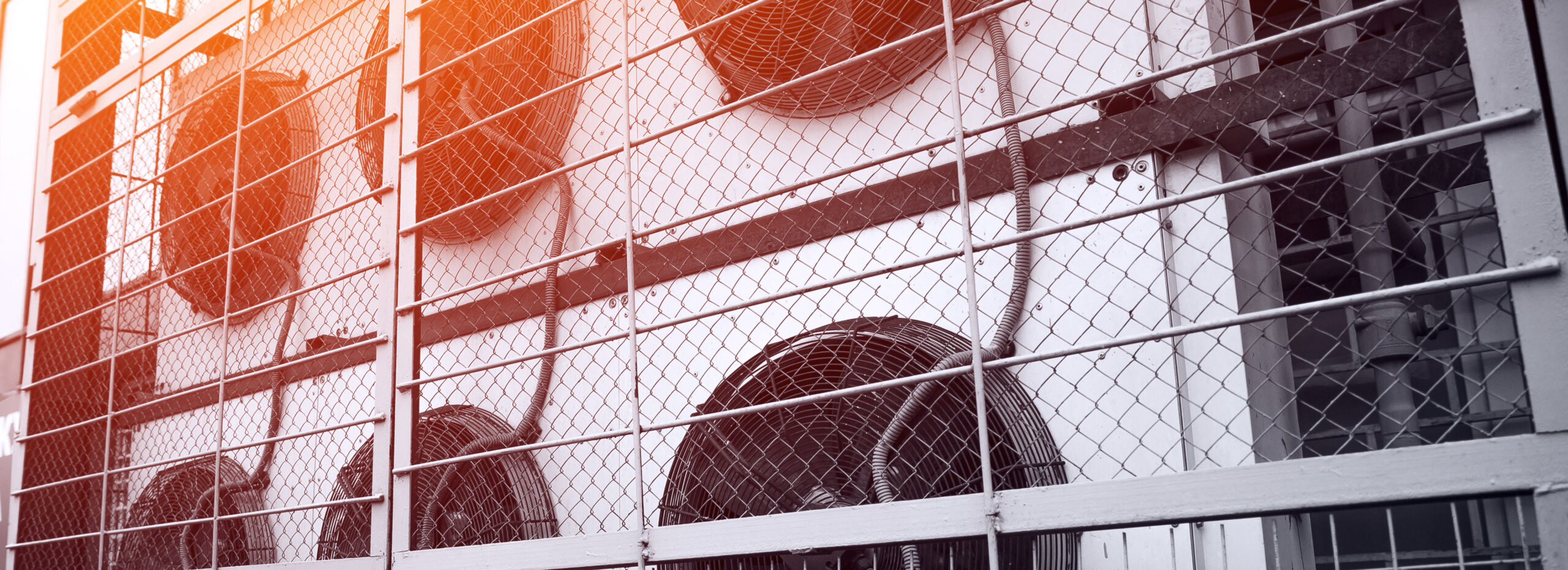
Partnerships with these countries are helping governments develop and accelerate efficient, clean cooling, policies, standards, and programs, including compliance schemes and financial incentives, with the potential to reduce emissions and contribute to sustainable development. These policies, standards, and programs are helping inform and implement cooling efficiency plans (Window 1) and can be integrated into F-gas transition plans as required by the Montreal Protocol, as well as into Nationally Determined Contributions as required by the UNFCCC.
Governments should implement new policies that help manufacturers' energy-efficient and climate-friendly appliances enter markets to meet growing demand for cooling services.Erik Solheim, Executive Director of UN Environment, Hakan Bulgurlu, Chief Executive officer at Arçelik AŞ, and Egel Larsson Grossman, Chief Executive officer at MABE.
Supporting standards and labeling to drive best practice efficient AC markets
Establishing state of the art energy efficient standards and labeling in the AC sector
Who? Instituto Clima e Sociedad (iCS), and the Energy Research Office (EPE) of Brazil, Contributing partners include LBNL, INMETRO, PROCEL, University of Santa Catarina, IGSD and International Energy Initiative Brasil.
Where? Brazil
How? By providing technical assistance to the Brazilian Government to help develop policy for room AC manufacturers in Brazil to transition to greater energy efficiency and take up low GWP refrigerants
Why? ACs are responsible for a major share of domestic electricity consumption in Brazil, yet there is low market penetration of high efficiency / low GWP AC units. The majority of ACs contain high GWP refrigerants HCFC-22 and HFC-410A, leading to high GHG emissions.
Highlight: Brazil moved quickly to announce a new consultation on MEPS for room AC in late 2017, making it the first K-CEP supported country to progress policy action for more efficient, clean cooling.
Designing and implementing financial mechanisms for efficient, clean cooling
Technical support to identify funding options for efficient cooling systems
Who? Institute for Energy Conservation (IIEC).
Where? Cook Island and Palau.
How? Providing technical support and capacity building to national energy officials, National Ozone Units and financial institutions to help identify funding options for investing in high-efficiency, climate friendly ACs. This will in turn support the development and implementation of MEPS and labels for climate-friendly ACs for the Pacific Appliance Labelling and Standards (PALS) project.
Why? To get financial institutions focused on energy efficiency projects so as to unlock funding, and catalyze other energy efficiency project funding in the Pacific region.
Support with compliance and verification systems
Building the foundation for a regional cooling efficiency compliance network
Who? CLASP and the Economic Community of West African States (ECOWAS)
Where? West African States.
How? Providing expertise and facilitation to help national compliance agencies share test results and market intelligence on non-compliant or sub-standard cooling products and safeguard the benefits of cooling efficiency activities in the region.
Why? To develop a cost-effective regional network with best practices, collaboration and enhanced understanding of the issues in order to encourage similar programs in other regions in Africa, and to overcome the problem of policing borders between African countries.
Supporting private sector leadership initiatives in energy efficient cooling
Implementing a new Refrigeration Resolution for members of the Consumer Goods Forum
Who? EIA, shecco, and the Consumer Goods Forum – a global industry network which brings together consumer goods retailers and manufacturers to drive positive change, including greater efficiency.
Where? Global supermarkets, including AEON, Walmart, Carrefour, Tesco, Metro, AHT, and Ahold Delhaize.
How? The 2016 Resolution commits CGF members to install new equipment that utilises only natural or ultra-low global warming potential refrigerants, in all refrigeration equipment along the food and beverage supply chain. K-CEP’s support will help to implement the existing resolution, and to incorporate energy efficiency. Implementation requires engagement with and education of the industry on efficient, clean cooling. The growing recognition of the need to combine energy efficiency with the HFC phase-down was highlighted in a report by CGF in December 2017. Shecco is producing a report in 2018 on efficient HFC-free supermarket refrigeration, which will be used to develop thinking on a potential CGF commitment on energy efficiency.
Why? The world’s biggest supermarkets have large carbon footprints and global reach, and can provide best practice examples of energy efficiency for the rest of the sector.
By gathering together the low-carbon solutions used in the Consumer Goods sector – from manufacturing to distribution to final consumers – we will be able to accelerate the implementation of efficient and proven technologies, thus increasing the sector's contribution to the climate transition.Alexandre Bompard, Chairman and CEO of Carrefour, a major international supermarket which has committed to the 2016 CGF Resolution.
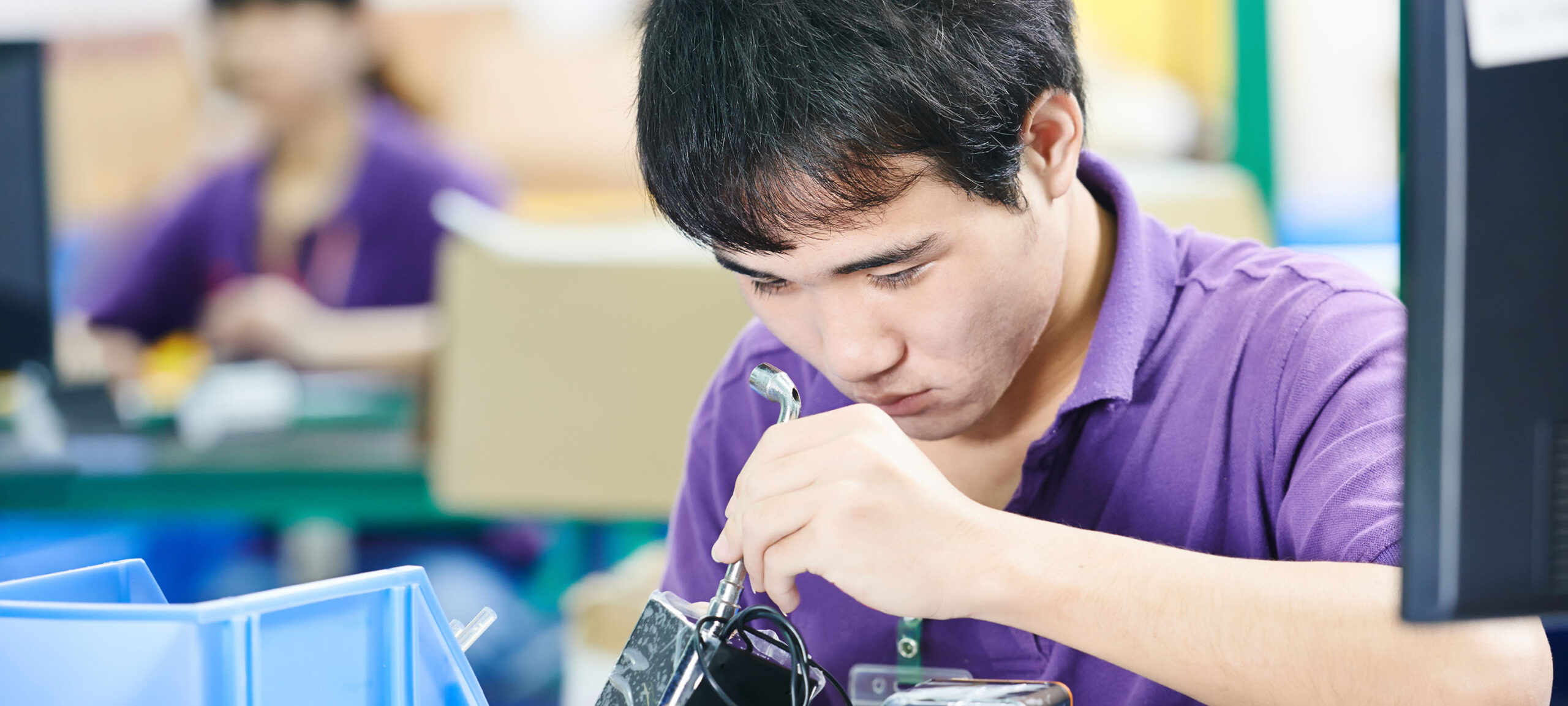
Cooling Efficiency in China – a global scale opportunity
More About This Case StudyChina is the world’s largest manufacturer, consumer and exporter of room air conditioners. As well as Chinese leaders Gree, Haier and Midea, the major global manufacturers, such as Korea’s LG and Samsung; Japan’s Panasonic, Mitsubishi, Fujitsu and Hitachi; and Fedders from the US, have all established factories in China.
China’s progress on cooling efficiency is critical to global success in reducing emissions from cooling. K-CEP aims to help China lead the global transition to clean, efficient cooling through enabling policy and business leadership.
AC ownership in China’s cities skyrocketed from almost 0% in the 1990s to over one AC unit per person in 2005. For the Chinese market alone, shifting the 2030 stock of room air conditioners to ones using improved efficiency technology and low-GWP refrigerants would reduce annual emissions by an estimated 0.85Gt CO2e, equivalent to over eight times the capacity of the Three Gorges Dam. Raising domestic standards for efficiency in residential ACs has a knock on potential, because China exports a similar volume of room ACs as it sells domestically.
K-CEP is supporting the Energy Foundation China (EFC) to maximize the mitigation potential in residential and commercial air-conditioning in China through the development of energy efficiency standards and labels and complementary market transformation programs. The estimated pollution reduction potential is 43.6 Gt CO2e over the period 2020-2050. This work is being coordinated under the China Cooling Efficiency Initiative with a project led by IGSD with LBNL and CNIS to strengthen MEPS for China’s room ACs.
EFC is working with the Ministry of Ecology and Environment (MEE, former Ministry of Environment Protection) and National Development Reform Commission (NDRC), as well as supporting partners from research institutes, NGOs, industry associations, AC manufactures and retailers. The approach includes standard setting, labeling, financial incentives, training and policy enforcement, underpinned by techno-economic analysis of policies and the production of a best practice guide for efficient cooling solutions in the domestic and global markets. EFC also supports a technical steering committee on cooling efficiency to advise the integration of energy efficiency improvement led by NDRC and Montreal Protocol implementation led by MEE.
China will make sustained efforts to promote cooling efficiency.Wang Shancheng, Deputy Director General of the Department of Resource Conservation and Environmental Protection (NDRC)
Finance is a barrier to advancing energy efficiency in cooling solutions, however less than 0.1% of total Overseas Development Assistance (ODA) is currently directed to cooling solutions. Significantly more public and private financing is needed for a transformational shift to efficient, clean cooling for all.

In our first year, K-CEP launched a landscape review of impact investing in cooling in recognition of the growing interest in both cooling and impact investing and because of the lack of comprehensive, reliable information to guide investment decisions. We expect the results of this work to be available in the second half of 2018.
K-CEP also worked with finance sector professionals and others over the past 12 months to explore what is needed to drive increased investment in efficient, clean cooling solutions. We studied examples of energy efficiency financing initiatives with a view to learning lessons and determining how philanthropy can best add value in helping to unlock much needed finance for cooling efficiency. Our research revealed two needs:
- Finance for technical assistance (TA): specialized assistance is required to devise the appropriate technical specifications and performance metrics and generate the demand for the financing mechanism. It is also important to make the case for cooling efficiency investment when suppliers and buyers have other options to maximize their utility. TA is also often needed for project management as energy efficiency projects can be complex (eg MRV needs).
- Finance for capital costs – which may include some concessional funding to cover the incremental cost of the higher efficiency option.
Our consultations also confirmed that there are multiple paths to achieving higher efficiency in cooling during the refrigerant transition. To allow for learning and encourage creativity in the field, we agreed that K-CEP should offer support for unlocking finance in an open process, building on the approach that has been successfully implemented for Windows 1 and 2. This support (K-CEP’s Window 3 – finance) will be delivered through a partnership with The Carbon Trust. They will manage an application process to invite potential partners to submit proposals for K-CEP funding from USD 2 million to USD 5 million to support efficient, clean cooling finance programs. Successful applicants will be able to use the funding for technical assistance or concessions on capital finance for activities that unlock finance, demonstrating additionality to business as usual.
Cooling is an essential part of everyday life – our food is kept chilled, life-saving vaccines and temperature-sensitive medicines are stored safely, agriculture products are delivered to the market, and our work, home, religious, educational and recreational environments are kept comfortable.
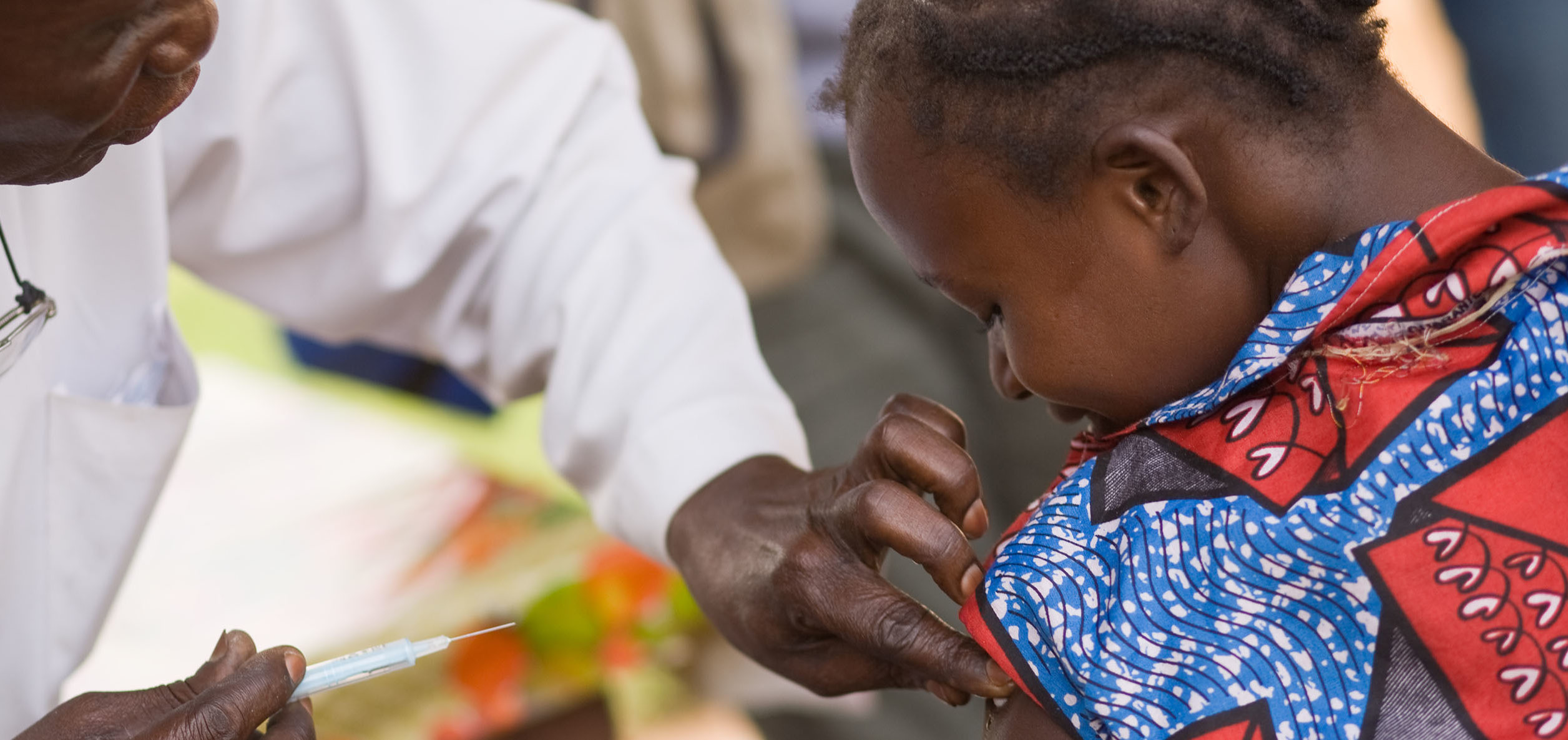
Cooling helps maintain productivity, sleep and health, increasing prosperity for all. However, access to cooling is not universal. The poorest people and communities are underserved, creating major productivity losses as well as adverse impacts on the provision of quality health care, nutritious food, and education. This in turn undermines the efforts and opportunities for many countries to fully realize the Sustainable Development Goals, such as ending poverty and hunger, reducing disease, and preventing dangerous climate change. Access to efficient, clean cooling is critical to avoid locking in high carbon cooling, while populations in emerging economies pursue thermal comfort.
Developing countries shoulder the greatest burden when it comes to heat stress – due to both their existing climatic conditions and the onset of climate change impacts. The 30 hottest cities in the world are in developing countries. Globally, over 1 billion people lack access to energy and therefore are likely to lack access to cooling as well.
As part of our work to improve access to cooling, K-CEP is supporting the Cooling for All initiative, led by Sustainable Energy for All (SE4All); an initiative to spur action and political leadership in increasing access to cooling. The work of SE4All focuses on achieving growing cooling demands within a clean energy transition, and in turn, supporting faster progress to achieve the goals of the Kigali Amendment. It also aims to create a direct intersect between the Paris Climate Agreement; the Sustainable Development Goals; and the Kigali Amendment.
In 2017, SE4All established a Global Panel on Access to Cooling, led by co-chairs – President Hilda Heine of the Marshall Islands and Dr. Vincent Biruta, Minister of Environment for the Republic of Rwanda. The panel brings together eminent leaders from industry, academia, philanthropy and international organizations to provide data and evidence for access to sustainable, affordable and efficient cooling solutions for citizens; especially those in low income countries. The Global Panel met in New York and Kigali to develop a report, due in July 2018.
As temperatures soar, cooling demands risk creating a significant increase in energy demand, that if not managed through super-efficient technologies or clean sources, will cause further climate change impacts and a rise in emissions. The work of the Global Panel will therefore be critical to develop the evidence we need to understand the challenges and opportunities of providing cooling access for all.Rachel Kyte, Chief Executive Officer of Sustainable Energy for All and Special Representative of the UN Secretary-General for Sustainable Energy for All (SEforALL)
The Global Panel has identified three critical areas for action on cooling for all, indicators of progress and their connections with the SDGs.
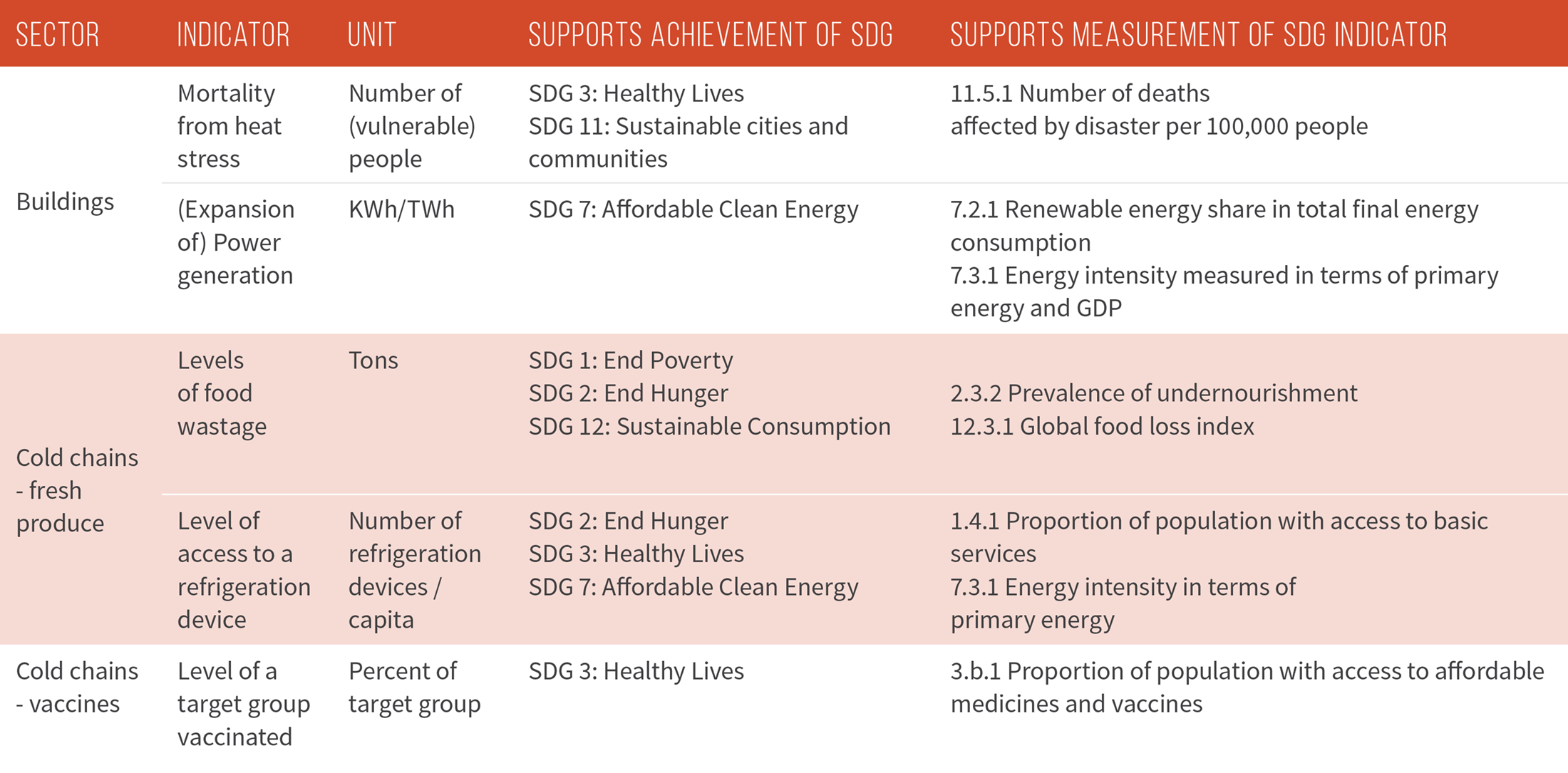
Map: Action on Cooling Efficiency
The Efficiency Cooling Office
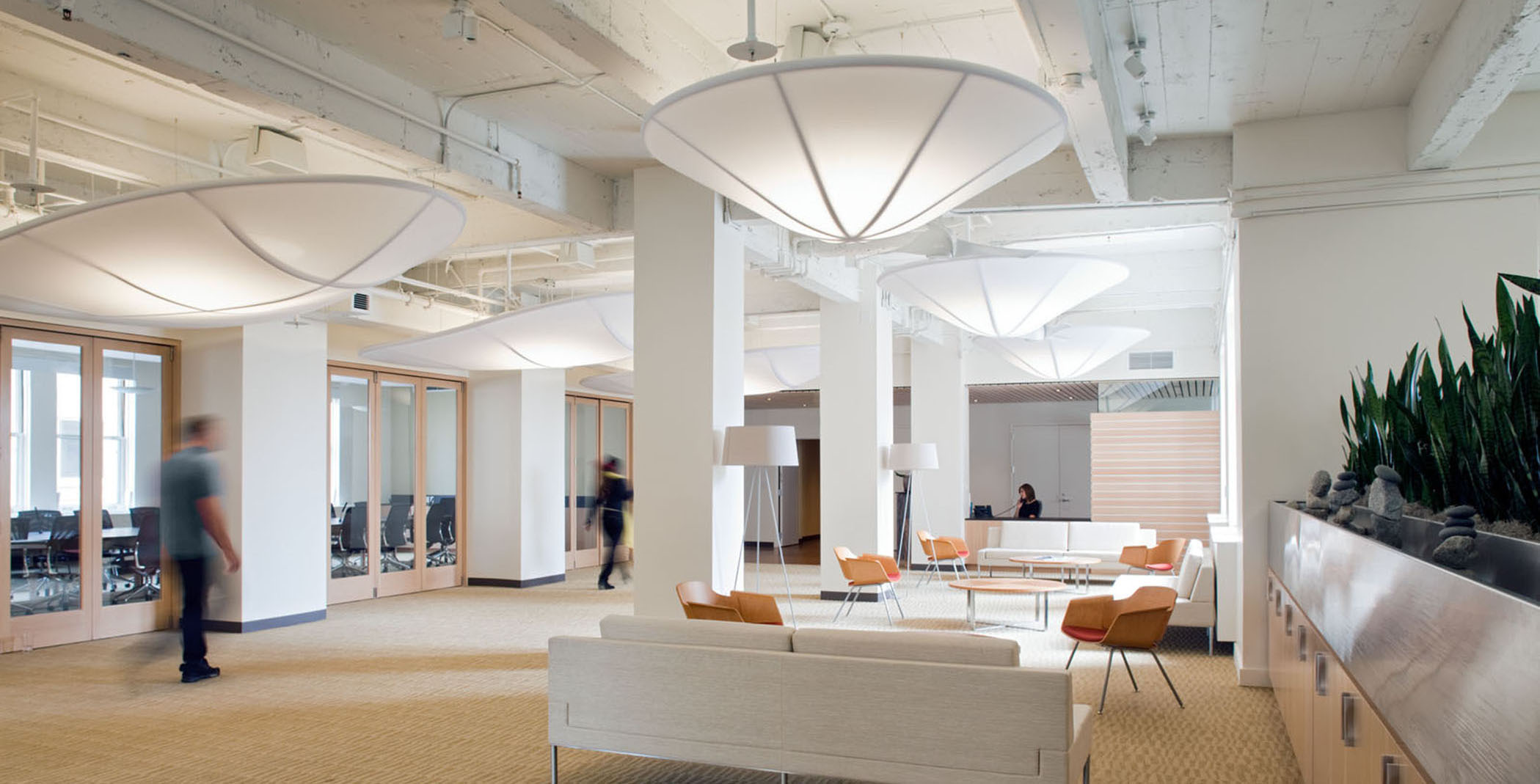
The Efficiency Cooling Office (ECO) serves as the K-CEP program office, housed at ClimateWorks Foundation. ECO provides grant-making, reporting, program and knowledge management, and other services to help K-CEP funders and partners collaborate and maximize the climate and development benefits of K-CEP.
The team is led by Dan Hamza-Goodacre, K-CEP Executive Director. Dr. Gabrielle Dreyfus is Head of Policies, Standards, and Programs. Hu Min is the China Adviser and Head of Access to Cooling. Shilpa Patel is Head of the Finance Window and Hex Picot is the Program Management Officer. They are supported by finance, administration, collaboration, events and reporting, monitoring, evaluation and learning experts.
So what have we been doing in our first year?
Program strategy, engagement and collaboration
Our strategy and theory of change was devised in consultation with over 100 experts. We support the Montreal Protocol process while embedding energy efficiency into the refrigerant transition. Engagement with experts and funders was built into our way of working from the outset, including setting up a diverse Technical Advisory Committee (TAC) to provide guidance on strategy, investments, and implementation. Funder engagement is core to our approach. We report to our Funder Steering Committee (FSC) during quarterly meetings, and based on a ‘scorecard’. The K-CEP Business Plan sets out our systems, procedures and approach. And because learning is a key part of our program, an independent evaluation is being set up.
Collaboration within our K-CEP community of grantees, advisors and funders is the backbone of ensuring an effective program with a lasting legacy. K-CEP launched an online portal as a dedicated informal space for information sharing, updates and discussion. This provides a unique opportunity for program partners to collaborate in real time and help ensure that K-CEP’s impact stretches beyond direct implementation benefits, to a wider, major shift in awareness around efficient, clean cooling within the climate and development fields.
K-CEP has made it possible for our UN Environment teams working on energy efficiency and ozone layer protection to join forces in a deep way. We have very complementary knowledge, skills, and networks but haven’t ever worked together on a common cause. The Kigali Amendment provides the rationale and K-CEP provides the framework and funding that’s made this deep collaboration possible.
Mark Radka – Chief, Energy and Climate Branch, Economy Division, UN Environment
Communications
Our communications share news of activities and progress with our partners and stakeholders. Our website houses program information, along with knowledge products and news. We also share updates via our quarterly newsletter and Twitter feed. In the last year, we have launched the following:
Website – 15,039 unique pageviews

Knowledge – 4 K-CEP newsletters and 5 K-CEP publications
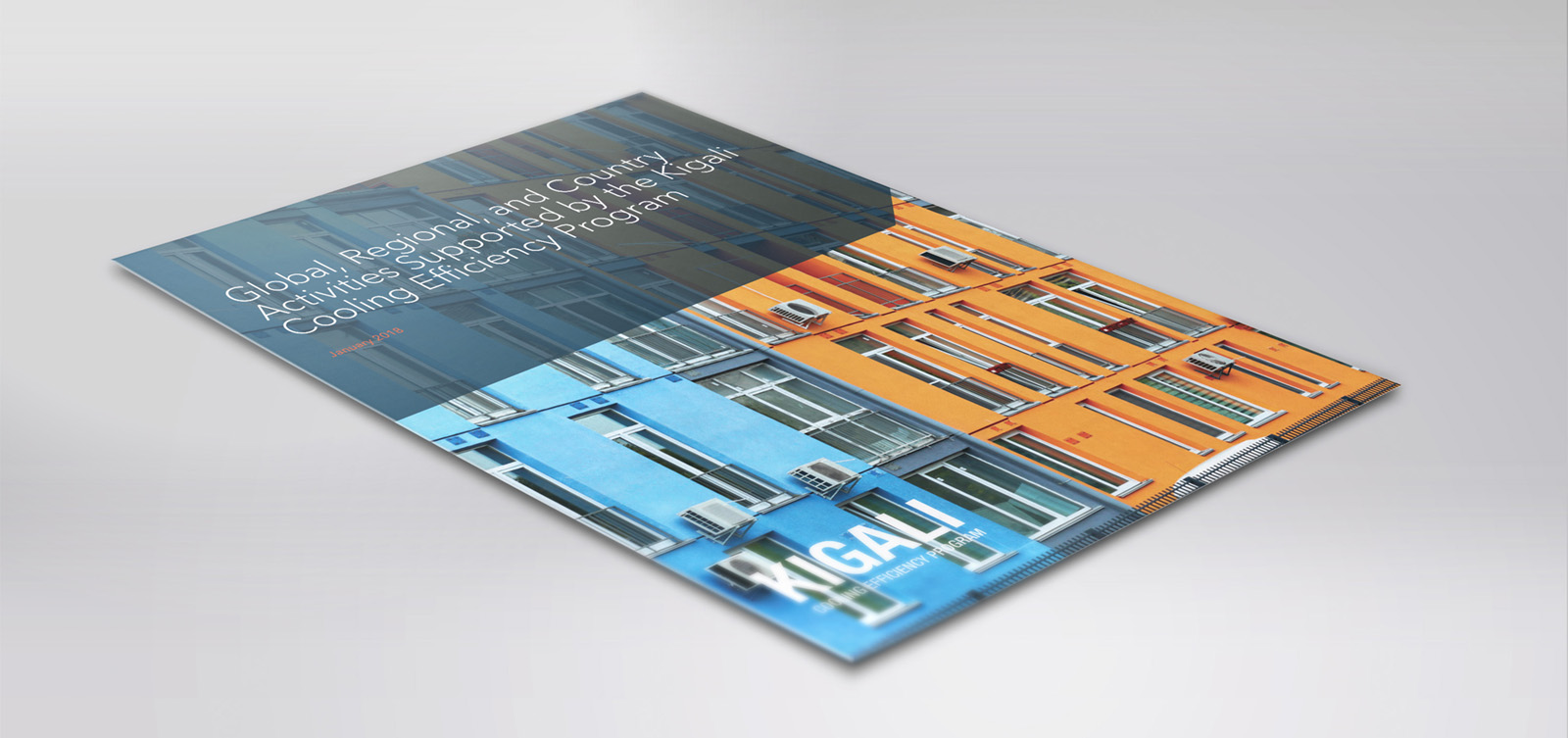
K-CEP Timeline
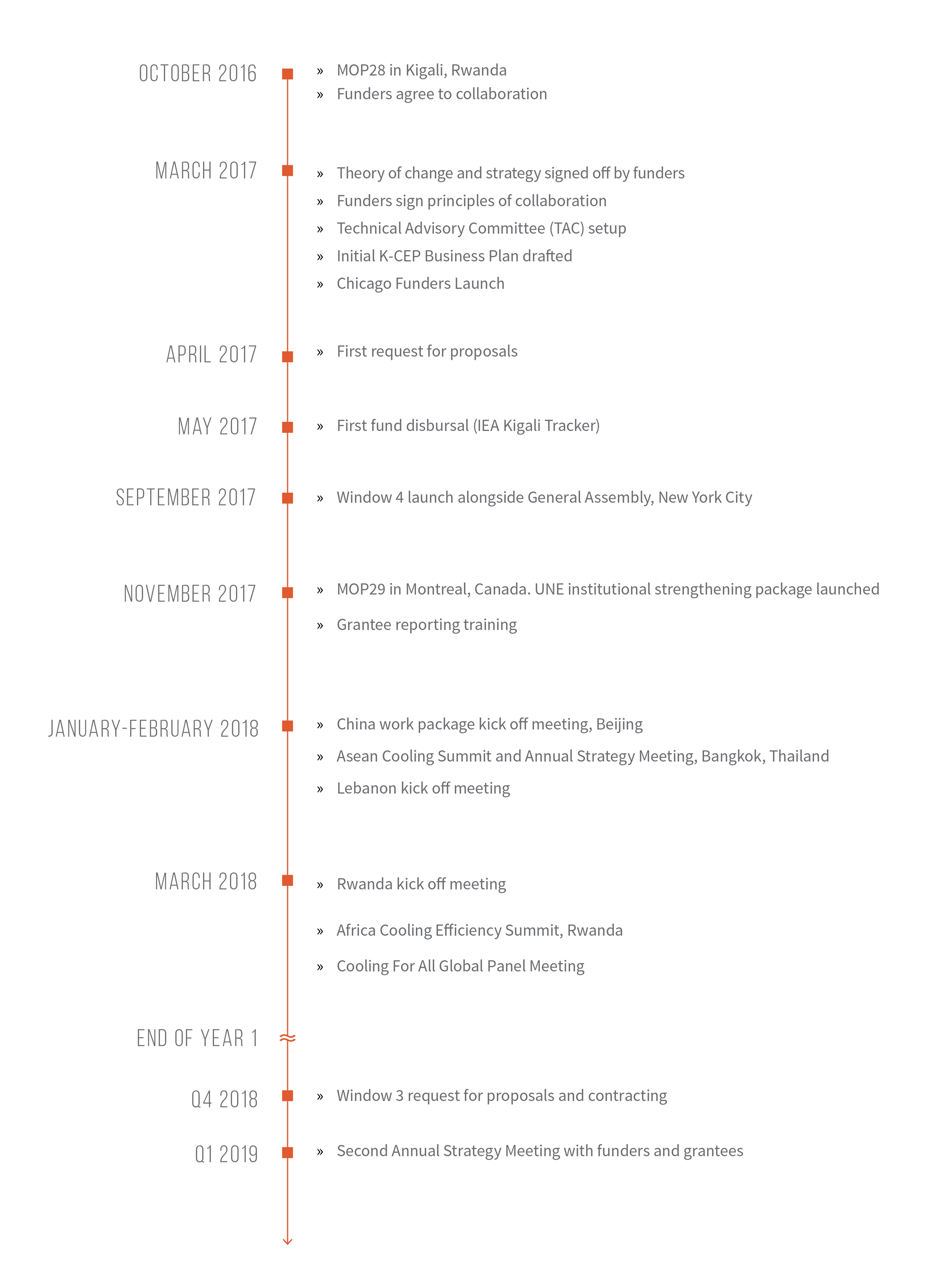
Project List
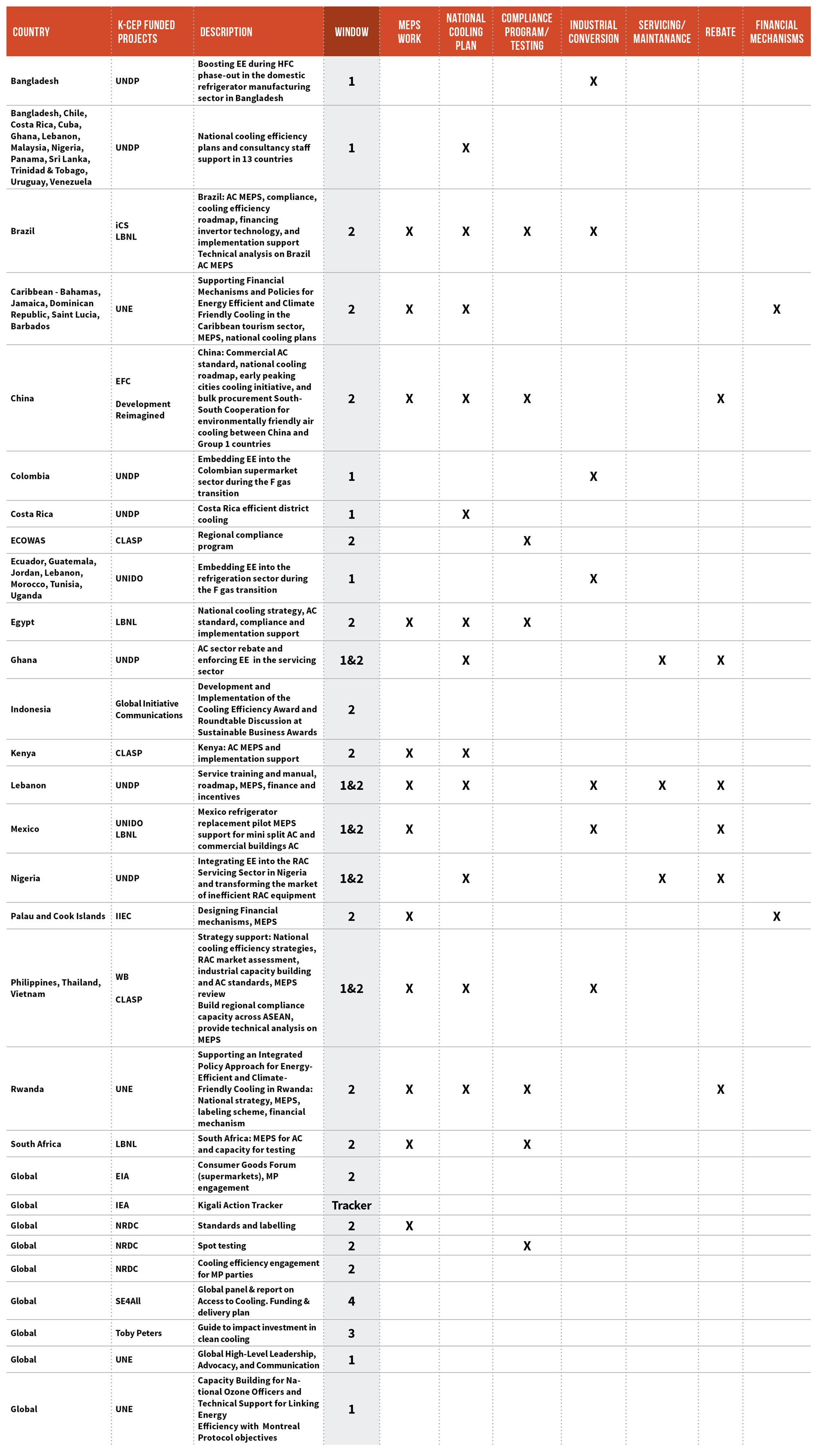
Results Framework
The K-CEP results framework is key to our progress. It enables us to use our strategy and intended impact in order to determine activities during the years of the program, and the longer term outcomes we are aiming to achieve. This table shows activities set out for the first year of K-CEP, and our progress against them. The overall results framework has been agreed with our Funders, and we have worked with our partners to determine the activities and outcomes that individual projects contribute towards achieving.
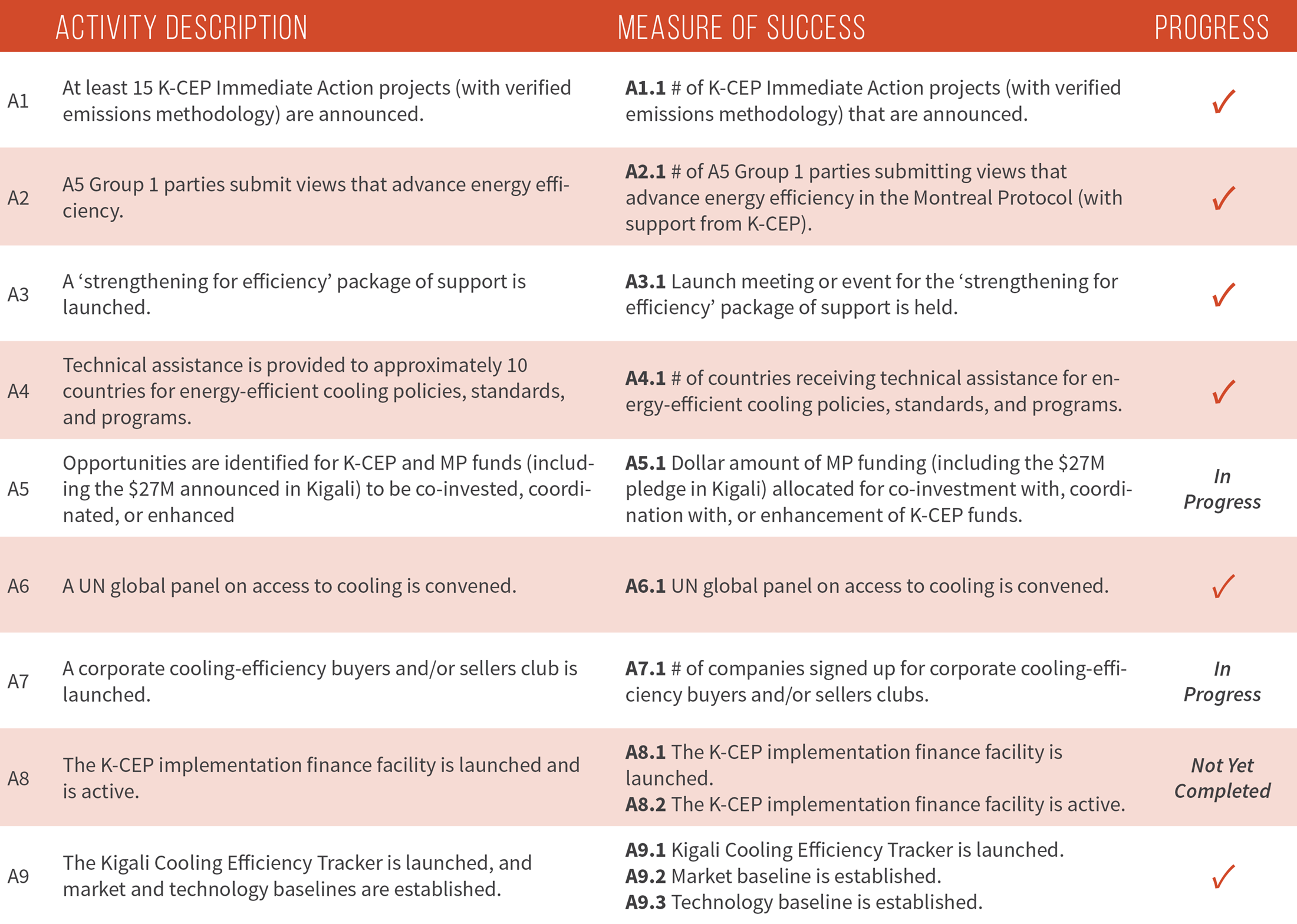
Kigali Progress Tracker
A single resource for all cooling-related information
The International Energy Agency (IEA) tracks, analyzes and manages global energy data and is developing the new Global Exchange Platform as a one-stop resource on energy efficiency. The first deep-dive module within this platform is on cooling. The module serves as the Kigali Progress Tracker and brings together all cooling-related information into a single resource.
Tracking market progress towards efficient, clean cooling
This new Global Exchange on Cooling is collecting information on cooling efficiency and enables users to generate charts, maps and download data on cooling energy use, policy and technology data, including information on: MEPS and appliance labels across 57 countries; summaries of cooling equipment efficiencies (data mined for more than 2 million pieces of cooling equipment); and cooling energy use by country and region.
In addition to setting up the Exchange, this first year has focused on establishing baselines. As the graph below demonstrates, the baseline for penetration of efficient air-conditioners in various markets around the world is low – the market average efficiency of air-conditioners is three times less than the best available efficiency. In many developing countries it is far worse. The majority of countries still have no or extremely low minimum energy performance standards for cooling technology. This platform is enabling the IEA and K-CEP to track the success of the program while also using the improved data and analysis to design improved policies, better allocate funding, and identify appropriate technology opportunities.
The market average residential air conditioners tend to be only half as efficient as the best models on the market. Note: seasonal energy efficiency ratio metrics are not directly comparable across countries.
Live feedback and improvement
In addition to IEA research, the new platform is also developed to enable partners and the public to provide feedback directly inside the platform to enable improved data collection and information sharing. Reporting from K-CEP partners can also be imported into the platform to enable improved data and information for countries that K-CEP is supporting. The Global Exchange on Cooling is already generating fresh insights into cooling emissions, markets and policies that are being used to understand market variations and track progress by country, technology and policy.

Financial Update
To promote efficient, clean cooling for developing countries, K-CEP aims to be:
- Fast start – measures are put in place and implemented on a rapid timescale
- Value for money – maximizing impact and funding to the field
- Anchored by work on the ground – fund local organizations where possible
- Fostering a collaborative learning environment – encourages best practice sharing
A fast start
Our mission is an urgent one, and for K-CEP to deliver against our results framework within our program lifespan we must move quickly. In the first year, K-CEP has committed $30m of funding, of which over $22m has been awarded to date.

Delivering value
K-CEP provides many multi-year grants, allowing grantees to create effective multi-year implementation plans, and operates on a milestone driven approach to ensure value for money and accountability for results.
The ECO team implements K-CEP on a lean staffing model, in order to maximize the percentage of K-CEP funding which goes to grants. We also seek opportunities to co-fund with other organisations, and to find partnerships with organisations and individuals, in the public and private sector, through which our efforts can enhance theirs for greater collective impact.
Feet on the ground in developing countries
K-CEP’s grant-making provides an opportunity to promote capacity building within developing country institutions and south-south knowledge sharing. Encouraging our grantees to contract local experts increases the likelihood of our impacts being sustainable in the long term in the countries in which we work.
In year 1, 30% of funds awarded have gone to developing country organizations and individuals, and 48% has gone to UN organizations and the World Bank. The percentage of funding going towards developing country institutions is set to increase as our grantees such as UN agencies contract developing country experts to deliver capacity building and technical assistance on the ground.
In our first year, K-CEP funding has gone to support 38 countries, working through 15 organizations.
Funding by K-CEP Window
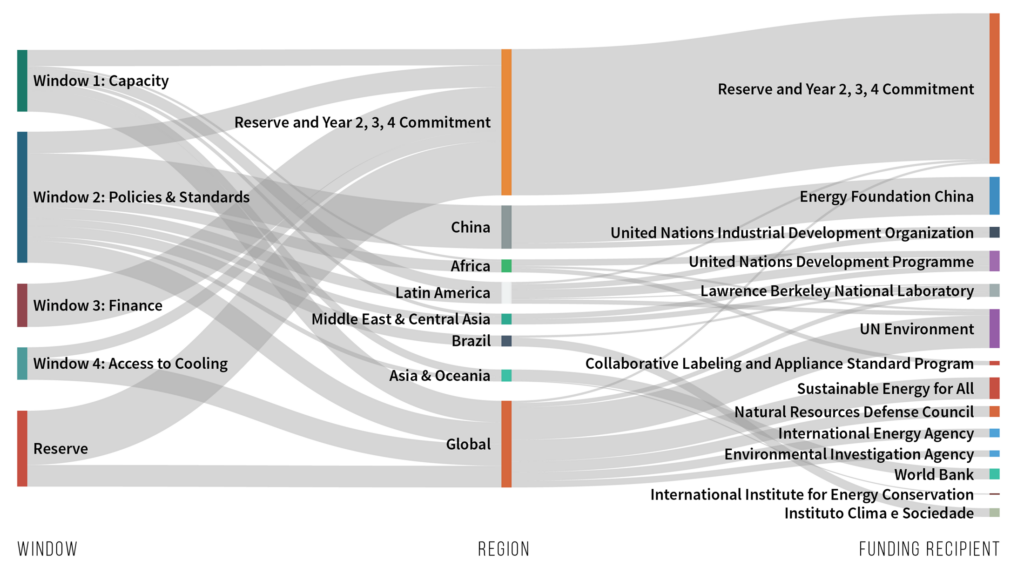 Creating a collaborative learning environment
Creating a collaborative learning environment
K-CEP seeks to leverage the vast amount of talent and expertise within our grantee institutions, in order to create greater impact within the K-CEP program and related efforts. K-CEP invests to bring together grantees, experts and funders for in-person and virtual collaborations, allowing best practices sharing on common challenges, and creates a strong and supportive network. Learnings can be applied to other cooling projects beyond K-CEP to create even more impact on the refrigerant transition and cooling efficiency.
Looking ahead
In year two of the program our funding aims are to commit the rest of the funds available, increase the amount of funding going to local organizations and individuals, unlock additional finance using our funds, and improve efficiencies in the running of the program.
K-CEP would like to thank all our partners for their contributions to efficient, clean cooling for all.
Special Thanks
K-CEP thanks its partners and Technical Advisory Committee for their contributions to efficient, clean cooling for all.
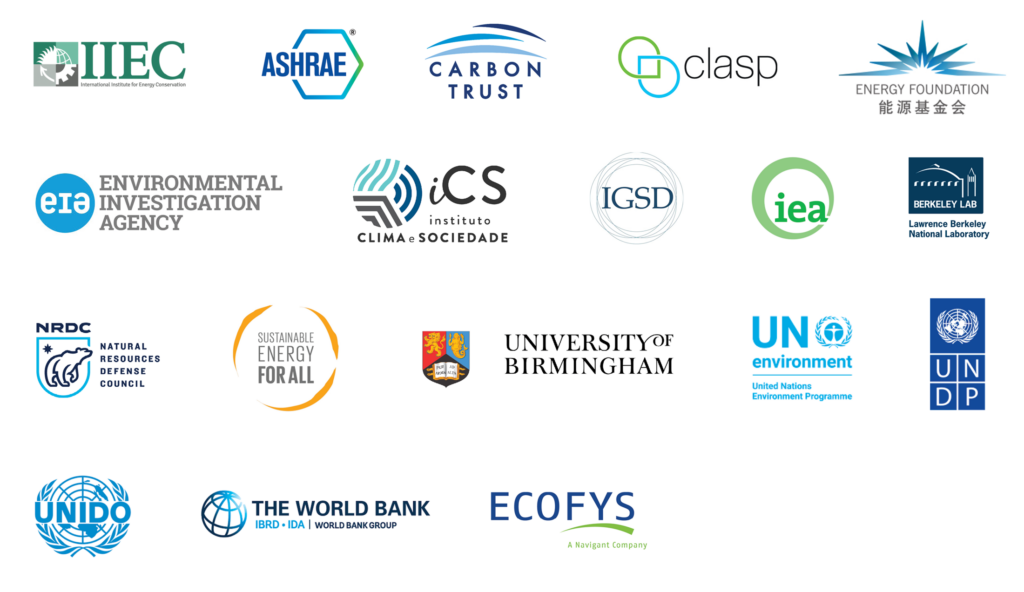
Technical Advisory Committee
Sommai Phon-Amnuaisuk
International Institute for Energy Conservation
Iain Campbell
Rocky Mountain Institute
Suely Carvalho
Independent Consultant
Walid Chakroun
American Society of Heating, Refrigerating and Air-Conditioning Engineers
Brian Dean
International Energy Agency
Christine Egan
CLASP
Samira Elkhamlichi
World Bank
Marco Gonzalez
Independent Consultant
Alex Hillbrand
Natural Resources Defense Council
Rachel Kyte
Sustainable Energy For All
Davinder Lail
Department for Environment, Food and Rural Affairs, United Kingdom
Shamila Nair-Bedouelle
United National Environment Programme
Samual Pare
Burkina Faso Government
Clare Perry
Environmental Investigation Agency
Stephan Sicars
United Nations Industrial Development Organization
Romina Picolotti
Centre for Human Rights and the Environment
He Ping
Energy Foundation China
Nihar Shah
Lawrence Berkeley National Laboratory
James Wolf
Independent Consultant
Durwood Zaelke
Institute for Governance and Sustainable Development
Xiaofang Zhou
United Nations Development Programme